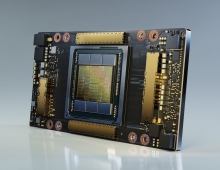
National Security Commission Report Identifies China's Advancements on AI, Urges U.S. to Invest More
An interim report from the National Security Commission on Artificial Intelligence — which was tasked by Congress to research ways to advance the development of AI for national security and defense purposes — was released today.
“How the U.S. adopts AI will have profound ramifications for our economic well-being and position in the world,” Eric Schmidt, the chairman of the commission and the former head of Google’s parent company Alphabet, said during a meeting with reporters in Arlington, Virginia, to discuss the findings. “We've got to get this right. It's not optional.”
The report identified five fundamental lines of effort to preserve U.S. advantages in artificial intelligence: invest in research and development; apply the technology to national security missions; train and recruit AI talent; protect and build upon U.S. technology advantages; and marshal global cooperation on artificial intelligence issues.
The commission is considering seven basic principles as it works to prepare recommendations, including: global leadership in AI; adopting artificial intelligence for defense and security purposes; building a shared sense of responsibility for the welfare and security of the American people between the private sector and government; the importance of people; the preservation of free inquiry; the compatibility of ethics and strategic necessity; and the importance of maintaining the United States’ values and rules of law in its employment of AI, according to the report.
The report also raised concerns about the progress China has made in the area or AI. It also said the U.S. government still faces enormous work before it can transition AI from “a promising technological novelty into a mature technology integrated into core national security missions.”
The U.S. government is not making enough investments in the technology, the report said.
“Federal R&D funding for AI has not kept pace with the revolutionary potential it holds or with aggressive investments by competitors. Investments that are multiple times greater than current levels are needed,” the study said.
Over the past five years, federal R&D funding for computer science increased by 12.7 percent, barely sustaining a field in which tenure track positions grew by 118 percent over the same period, the report said.
China is investing more than the United States in AI, said the report, which referred to the Asian nation more than 50 times.
“China is ahead in two areas. One is in the face recognition surveillance area. And another one is in financial technology. This does not mean that they’re ahead (in) AI overall,” said Eric Schmidt.
Part of the commission’s report addressed whether the United States should restrict American cooperation with Chinese AI researchers, including through visa and export controls. The challenge U.S. officials face is that American industry and academic leaders have said that any such restrictions would harm the U.S. economy, the report said.
The report said the United States should be open to cooperating with China on promoting the responsible use of AI, including for example jointly banning use of AI to authorize the launch of nuclear weapons.
The commission also expressed concern that China, by allegedly using AI to violate human rights, will set a bad example for authoritarian regimes. It noted that beside China, “at least 74 other countries are also engaging in AI-powered surveillance,” including half of “advanced liberal democracies.”
Calling attention to activism by tech workers who have protested industry partnerships with the U.S. military, the report said, “ethics and strategic necessity are compatible with one another.” There is widespread support for making the technology unbiased and safe, the report said, but “the Commission is concerned that debate will paralyze AI development.”
The AI technology also poses a threat, which could emerge from two areas: what an adversary could do with AI, and what consequences an AI system could have if employed without safeguards, the report said.
Potential threats include: the erosion of U.S. military advantage; risks to strategic stability; the diffusion of AI capabilities; disinformation and the undermining of the nation’s democratic system; erosion of indi
vidual privacy and civil liberties; accelerated cyber attacks; new techniques that could open up vulnerabilities; and accidents, the report said.
The government must work to avoid a future where “AI contributes to a world of greater centralized control; empowers authoritarianism; is utilized as an instrument to repress dissent and impose conformity; destroys truth and trust within societies and between states; and is employed in reckless, irresponsible and unethical ways," the study added.
The final report from the commission will be ready in about a year.





















